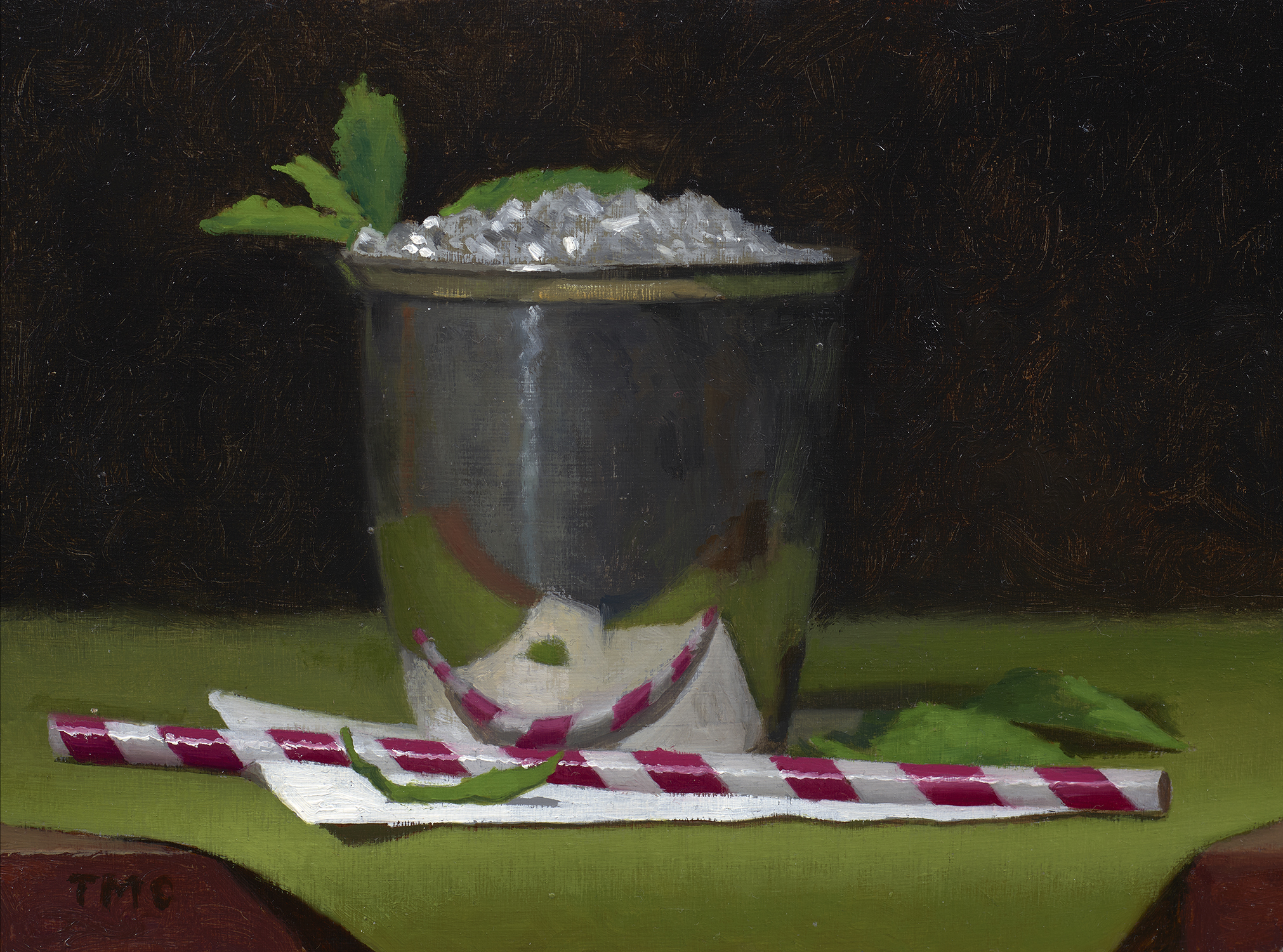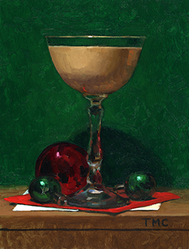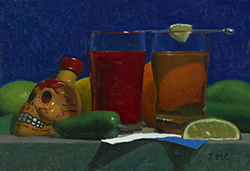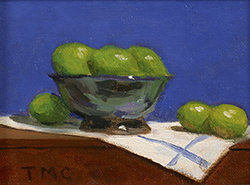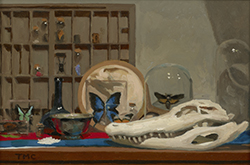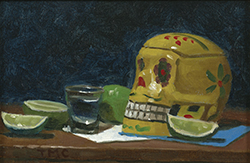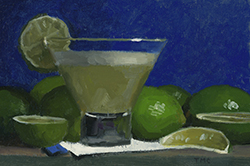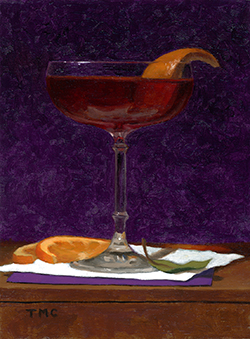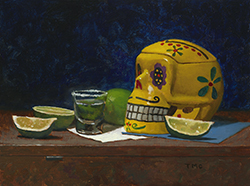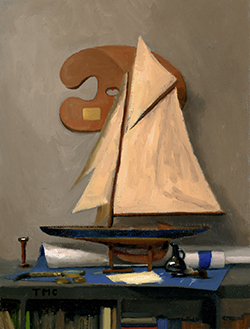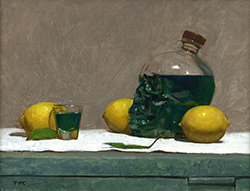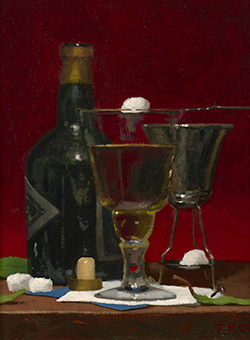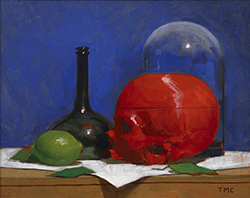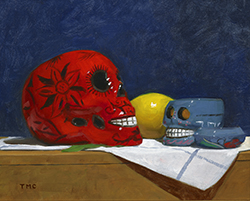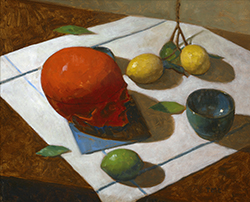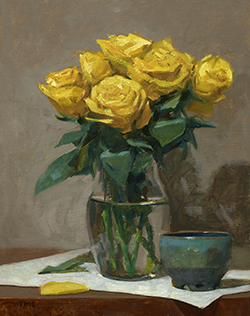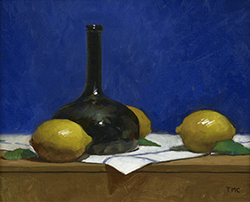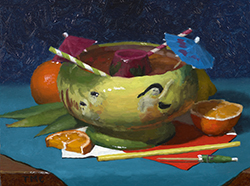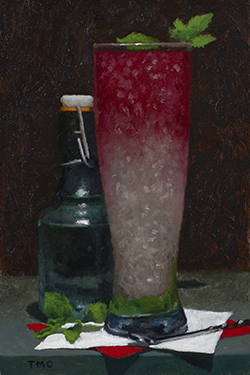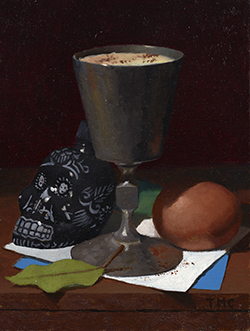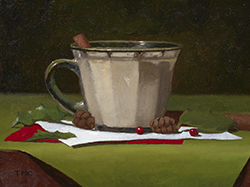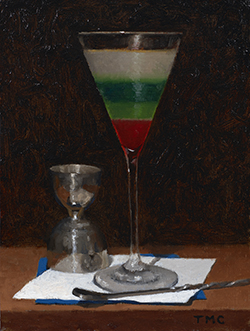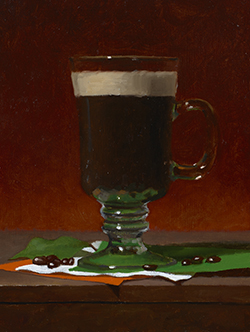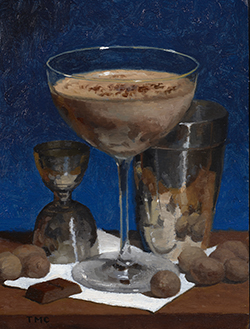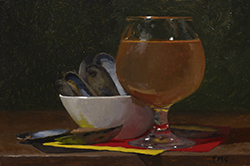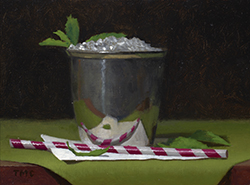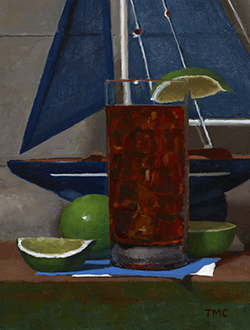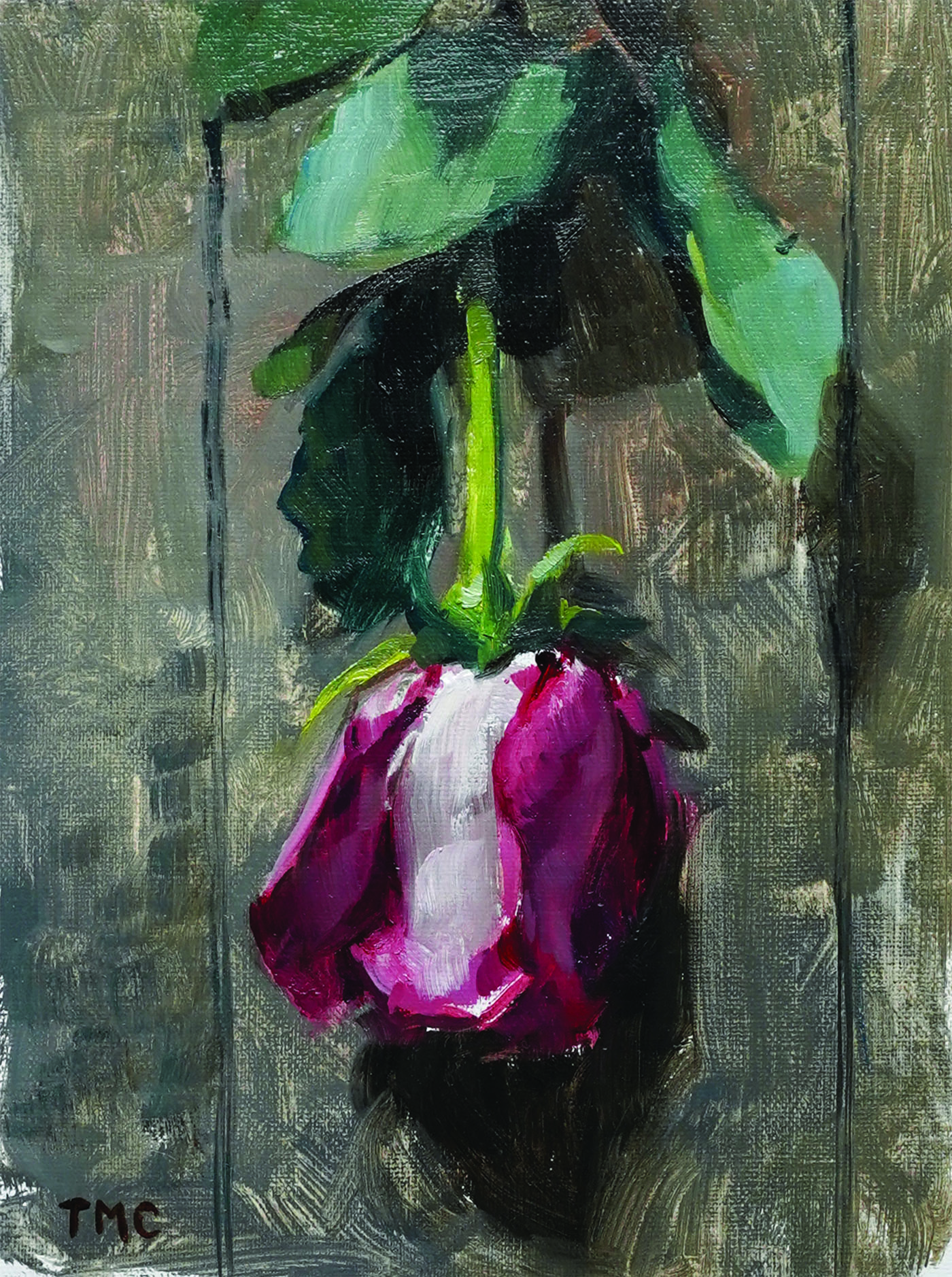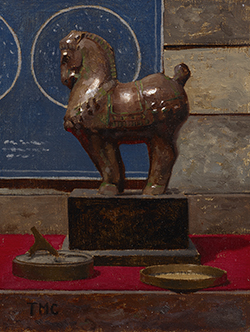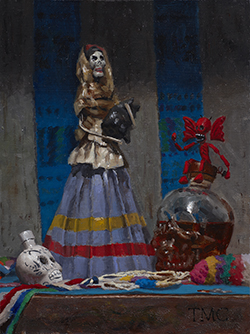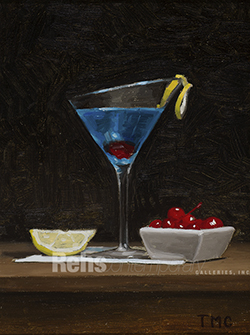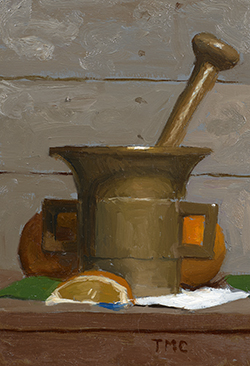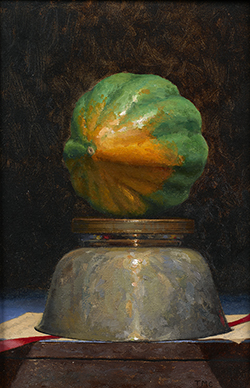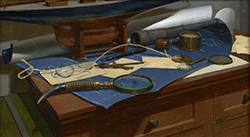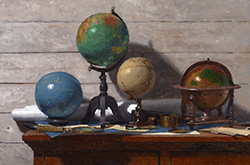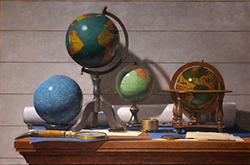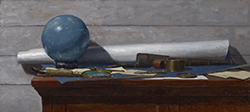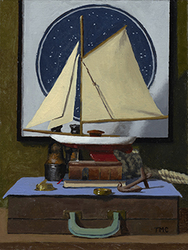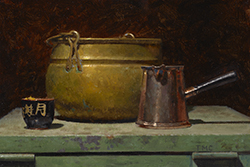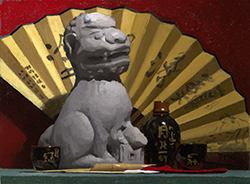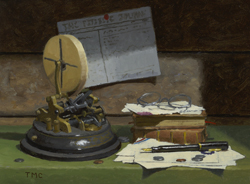Todd M. Casey
(Born 1979)
Mint Julep
Oil on panel
6 x 8 inches
Signed
BIOGRAPHY - Todd M. Casey (Born 1979)
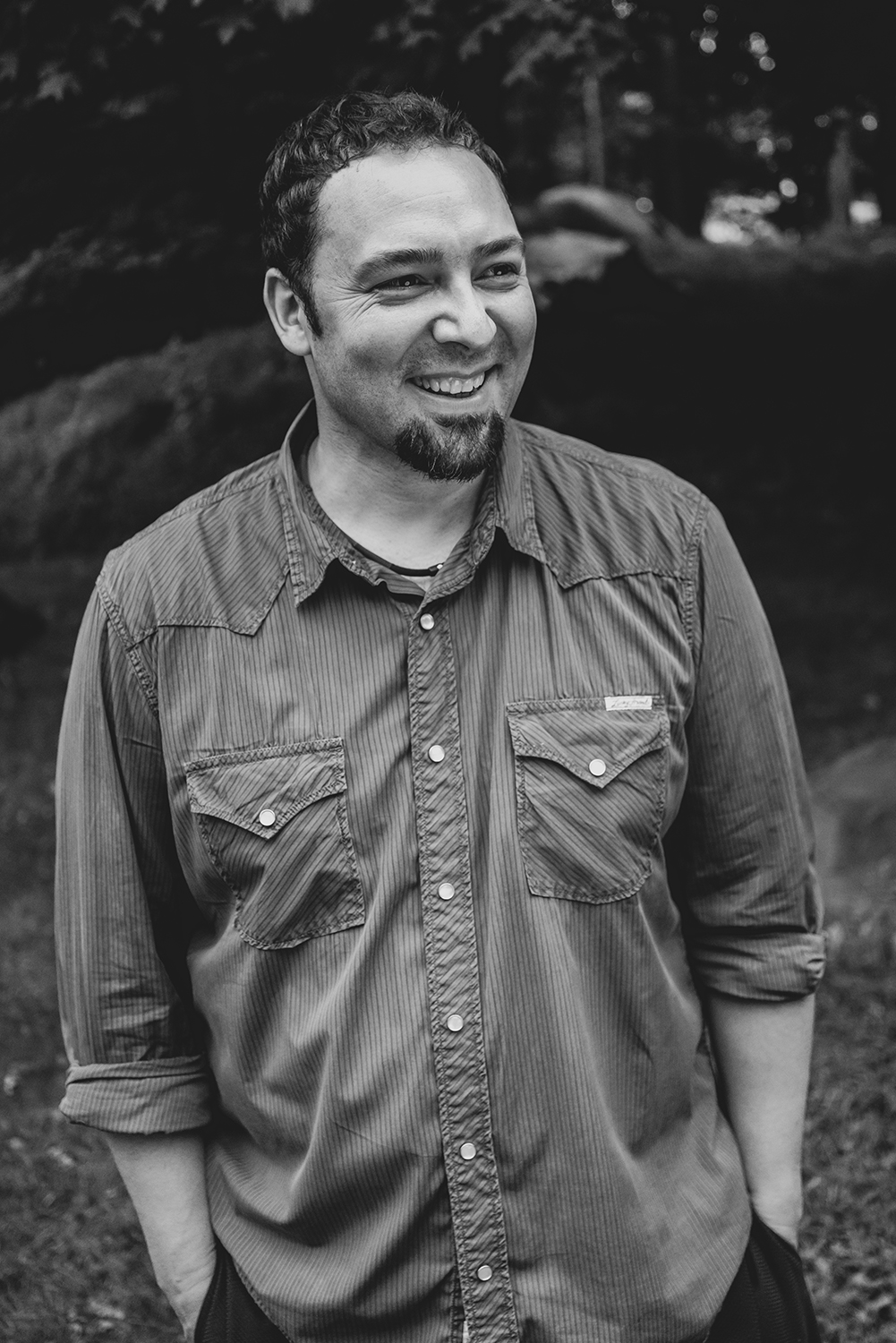
“I’m going to go paint. What else would I do?” That’s how Todd Casey describes the work that has absorbed him, one way or another, since his childhood in Lowell, Massachusetts. Born in 1979, Casey and his older brother both showed an early talent for drawing, and the natural competition between the two boys spurred them to work at being the “best” artist throughout their school years. Their parents, whom Casey notes “couldn’t draw a straight line”, encouraged them, recognizing that their sons’ abilities as artists might well be the foundation for future careers.
The historic cultural environment of Lowell also offered Casey examples of successful artists and writers. Although it is widely known as a major textile center, Lowell was also the birthplace of James McNeill Whistler (1834-1903) and the Beat poet and novelist, Jack Kerouac (1922-1969), both of whom are celebrated by the city today. In fact, the Whistler House Museum of Art, the painter’s birthplace, is now an active cultural center for the visual arts in the Merrimack River Valley, and the sponsor of an annual exhibition in which Casey has participated since 2007. Growing up surrounded by these nineteenth-century buildings and a lively cultural scene nurtured his curiosity about historic artifacts and stories.
Like many young boys, Casey was equally fascinated by sports, in his case basketball, which he played in high school. After graduation in 1997, however, his mother wryly pointed out that the NBA wasn’t in his future and that he should “do what comes naturally”, meaning that his talent for drawing was much more likely to offer career options. Throughout his junior high and high school years, Casey had consistently won awards for his art, so he rather casually decided to submit an entry to the National Arts Caucus competition shortly before graduation. The result was a first place award, and a trip to Washington, D. C. where he met Congressman Marty Meehan of the 5th Congressional District of Massachusetts, and received the award in a ceremony honoring his work. For the young artist, this was not only an “awesome moment” but a turning point in his decision to pursue art as a career.
That fall, he and his older brother both entered the Bachelor of Fine Arts program at the Massachusetts College of Art. One of the benefits of the college was its proximity to the Museum of Fine Arts, where all students received free admission. There, Casey was introduced to an encyclopedic range of art, but found himself intrigued by the work of Jean-Léon Gérôme (1824-1904), one of the leaders of French academic painting in the mid-to-late nineteenth century. His interest in this type of painting has remained a theme throughout his career, and ultimately, became the foundation for his current work. Following his graduation in 2001, Casey headed for New York City, where a friend was living, and determined to make a career for himself in the art world. Not surprisingly, his first job was as a waiter, but he worked his way into a position with the Ralph Lauren Corporation as a computer artist. Looking back on it, Casey comments that the deadlines were always crazy and the work was rarely satisfying, but that he gained a clearer understanding of working in the corporate world.
In 2005, after a year and a half of corporate life, Casey moved to San Francisco to study animation at the Academy of Art University. It was there that he met Warren Chang (b. 1957), a narrative realist painter who taught at the university. Chang not only exemplified a new way of thinking about contemporary painting, but he also introduced Casey to the work of other painters with similar approaches, including Jacob Collins, Anthony Ryder and Max Ginsburg. For Casey, it was as if “a door opened up” onto a world that involved work that was far more meaningful to him. By 2006, he left the Academy of Art University, having discovered that animation was “too much of an assembly line”, and returned to Lowell to consider what he wanted to do next. Despite his move back to the east coast, Casey has remained in contact with Chang, who continues to be a guiding influence on his career.
Having decided to return to New York, Casey realized that he first needed to pick up the things he had left in San Francisco. With the Bay Area as their destination, Casey and a friend set out on a road trip to the west coast with a list of artists that he wanted to visit along the way. In the process, he made new friends, introduced himself to new colleagues, and provided himself with an education in contemporary realist painting that he could not have obtained in any other way. By 2007, he was back in New York and back at Ralph Lauren Corporation to pay the bills. It was during this second stint at Ralph Lauren that Casey met a co-worker named Gina who was very supportive of his career as an artist. Four years later, they were married, and as Casey notes, “she still encourages me to paint.”
During these years, Casey studied with a variety of artists in order to absorb as much as possible about different approaches to realist painting. Max Ginsburg (b. 1931) was especially influential with his alla prima approach to painting, as well as his subject matter, which typically features figures who reveal the social conditions of working people. Casey studied with Ginsburg both at the Art Students League and privately; he has remained an important guide in Casey’s development as a narrative realist artist.
In contrast, Casey was equally fascinated with the academic approach to painting as exemplified by Jacob Collins’ Water Street Atelier. This exclusive studio, which accepts only fifteen students each year, required an intense commitment to training in traditional methods of drawing, painting and sculpting. Rather than using the alla prima method which involves the direct application of paint to canvas and the manipulation of various colors while they are still pliable, the Water Street Atelier approach was based on the classical academic technique of building up layers of paint by allowing each one to dry before applying the next. For Casey, “the world began” here as he learned the academic methods that would allow him to paint in the narrative realist style.
By 2009, Casey also began studying privately with Carlos Madrid (b. 1950) who deepened his understanding of color theory, and encouraged him to reflect more deeply on the meaning of his still-life paintings. As students, young artists are often given collections of still-life objects to draw or paint as exercises in learning to look carefully. For mature painters, however, the still-life becomes a collection of meaningful artifacts brought together to convey specific ideas; Madrid has been, and continues to be, instrumental in supporting Casey’s exploration of these increasingly discerning insights.
In 2010, Casey began teaching in order to cover his living expenses. His first foray into art education began with a short-lived project—the Guild Atelier for Narrative Painting in Brooklyn—that he developed with his former instructor, Camie Davis Salaz; while continuing his education during the day, Casey taught studio classes at night. Today, he teaches an online class at his former school, the Academy of Art University in San Francisco, accepts private students, and conducts workshops throughout the Northeast.
As he has developed his own voice as a realist painter, Casey’s work has received an increasing amount of attention. His paintings have been shown in galleries from Baltimore to San Antonio to Asheville, North Carolina as well as in New York, and of course, at the Whistler House Museum of Art in Lowell. In addition, he continues to receive awards, most recently the Aileen and Manuel de Torres Award for Still Life from the prestigious Salmagundi Club in 2013.
Casey perseveres in his study of traditional painting, taking workshops with more experienced practitioners in the field and maintaining his long-standing dialogues with Chang, Ginsburg and Madrid. Although his current focus remains still-life imagery, Casey comments that he is interested in exploring figural painting as well.
His approach to narrative realism is to create a mood and a sense of connection with the objects he portrays. As he explained this concept in the December 2012 issue of The Artists Magazine in a discussion of his award-winning painting: “I wanted to convey the loneliness of the particular objects in Bottles with Book and Letters, but I didn’t want to be too descriptive, so I left it to the viewer to interpret the narrative.” This desire to evoke a story and a mood in the viewer is what distinguishes Casey’s contemporary narrative realism and positions his historical methodology in the context the twenty-first century.
Janet Whitmore, Ph.D.
| AVAILABLE WORKS | ||||||||||||||||||||||||||||||||||||||||||

